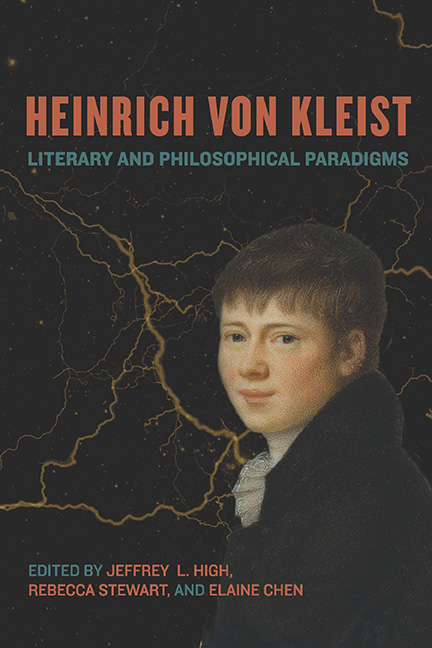8 - Kleist, Johann Joachim Spalding, and the Bestimmung des Menschen: Philosophy as a Way of Life?
Published online by Cambridge University Press: 26 May 2022
Summary
BESTIMMUNG DES MENSCHEN is a key term belonging to Heinrich von Kleist's (1777–1811) so-called pre-poetic period, appearing with great frequency in his writings from 1799 to 1801. Tellingly, the term is firmly associated with another crucial key term of the same period, that is, Lebensplan (life plan), which it helps contextualize within the framework of the late eighteenth century: Bestimmung des Menschen in fact represents one of the paradigmatic ideas of German thought from the Enlightenment to Idealism, linking religion to ethics but also enabling reflection on the individual's role in society. Most of all, the term serves to clarify the then prevailing intellectual trends, which prioritized practice over theory, hence providing a connection to the well-known view of philosophy as a way of life. Yet, thus far, the term has not received due attention from Kleist scholars, who generally mention it without deeming it worthy of systematic investigation.
The aim of this paper is precisely to fill this gap, focusing both on Kleist's usage of the term while also tracing it back to his most likely source, namely the treatise Die Bestimmung des Menschen (first edition 1748–eleventh and final edition 1794) by the Lutheran theologian Johann Joachim Spalding (1714–1804). In order to achieve this end, this essay will first address the state of the art, commenting on the small number of studies dealing with Kleist's knowledge of Spalding's text and/or employment of the relevant expression; it will second sketch Spalding’s significant contribution to the culture of his day by publishing what came to be a veritable bestseller, thereby revitalizing the ancient tradition of philosophy as a predominantly practical discipline; and it will, third and lastly, reconstruct Kleist's acquaintance with Spalding's work and thought, as well as his own appropriation of the concept in question. As a result, the essay will offer a more complete account of Kleist's early philosophical and theological studies, as well as a reevaluation of the import of these studies. Along the way, this essay will demonstrate how Kleist's allegedly immature and dilettante approach to philosophy actually belonged to the well-established, yet often misunderstood paradigm of protreptic, transformative, and performative thinking.
- Type
- Chapter
- Information
- Heinrich von KleistLiterary and Philosophical Paradigms, pp. 209 - 232Publisher: Boydell & BrewerPrint publication year: 2022



